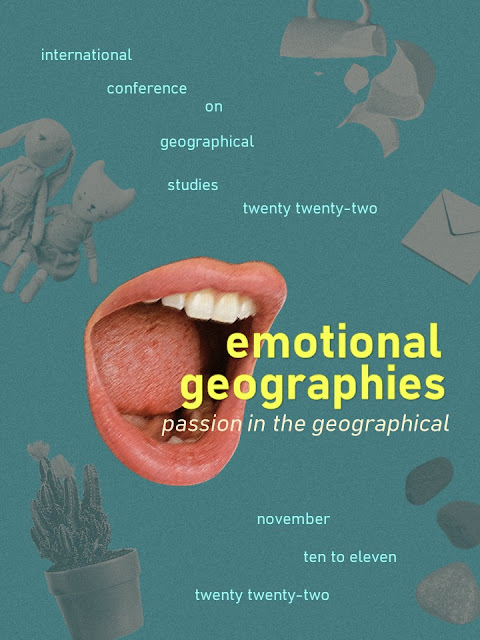ICGS 2022
Emotional Geographies: Passion in the Geographical
10-11 November 2022
The late Yi-Fu Tuan (1930-2022) argued that “much of human life is… driven by passion—by the desire to reach what is out of reach or even beyond reach” (2014, p. 4).
First drawing breath from informal circles and intellectual niches among cultural and feminist geographers, the passion behind the emplacement of emotions in geographical research and fieldwork and in formal channels became the spark plug that ignited its emergence in the academy. In 2009, feminist and political geographer Joanne Sharp observed: “It has been noted that this interest in emotion may be a reflection of changes in contemporary society where neoliberal notions of the internalized individual have made emotion a commodity to be consumed as a spectacle or a target for therapeutic intervention” (2009, p. 76). The conditions that made possible the recognition of emotion in geographical research spring from the transformative and emancipatory dimensions of fieldwork from cultural and feminist geographers whose research intersect public-private boundaries that accommodate both the expressed and the inexpressible and other ‘affective flows and rhythms’ (Tolia-Kelly, 2006).
Research that both intersect and incorporate emotion have been explored in multiple publics and discursive spaces: Sarah Wright’s research among agricultural workers in Negros Occidental to Lou Angeli Ocampo’s fieldwork among miners in Benguet. In both cases, the spaces of precarity are interwoven with gender, class, and agency. But there is also space that allows affective explorations like Danny Dorling’s work on kindness, and ethical reflections that navigate tricky terrains when claims such as "our hearts are in the right place, but it’s still not coming together” (Frankenberg, 1993) further complicate various intersectionalities.
This year’s International Conference on Geographical Sciences (ICGS) is enabling the deepening, broadening, and enrichment of our understanding of emotion and its deployment in and through multiple geographical practices, from field-based research and activist work to various pedagogies that straddle human, transhuman, post-human and more-than-human relationalities.
Topics and interventions that use, deploy, and mobilize emotions are encouraged for paper presentations, panel sessions, film screenings, map curations, art installations, book discussions, formations of reading groups, Q&As, and performances.
Among possible areas of explorations within global and local frameworks include:
• Emotional geographies in research, field work and pedagogies
• Sentiments and affective publics
• Stories, storytelling, and geonarratives
• Dwelling, housekeeping, homelessness
• Affective geographies of care
• Emotional cartographies and the making and unmaking of self
• More-than-human, transhuman, and post-human relationalities
• Visualizing and curating people’s intimate and emotional data
• Mappings of the spectral and the unseen
• Romantic and passionate geographies
• Radical and activist community-based fieldwork and practice
• Place and emotions among older adults
• Feminist and Marxist geographical praxis
• Therapeutic landscapes, spaces of healing
• Kindness and care-ful spatialities
• Alternative body politic of place
• Topophilia and geographies of love
• Violent geographies of the everyday
• Dis/abilities, dementia, and later life geographies
• Emotion and affect in nightscapes and nocturnal landscapes
• Emotional geohumanities, and literary geographies
• Geographies of grief, mourning, and bereavement
• Trans, queer and non-binary identification and sexualities
• Nature and environmental ethics
• Affective natures, ecologies, physical geographies, physiographies
• Death, dying and final geographies of care
• Carceral geographies and spatialities
• Heterotopic spaces of pandemic isolation and the ‘new normal’
• Labor and geographies of work
• Emotional geographies of hazards and disasters
• In/out of place and narratives of outsiderness
• Spatialities of pleasure
• Horror geographies and abjection
• Diasporic and migrant stories
To participate in ICGS 2022, here are the following guidelines:
For paper presentations, please submit the following:
- 250-word abstract
- 3-5 keywords
- Presenters and co-presenters’ names, affiliations, email addresses, bionotes
For panel sessions that feature, address, and engage with social, critical, and theoretical issues relevant to geography, submit panel session proposals with the following information:
- 200-word abstract
- 3-5 keywords
- Names of at least 3 panelists, with email addresses, affiliations, and bionotes
Submit individual abstracts and panel session proposals on or before 15 October 2022. Notification of abstract acceptance is on 22 October 2022.
ICGS 2022 runs from 10-11 November 2022 and will be held remotely. All presentations are to be recorded. These 15-minute video recordings are due on 5 November 2022. Those exceeding 15 minutes will be returned to paper presenters and will only be accepted when the 15-minute videos are re-submitted.
All submissions should be sent via this link: https://tinyurl.com/ICGS2022Abstracts
For inquiries, contact the ICGS 2022 Secretariat at icgs.ph@gmail.com. For updates, please visit our social media accounts:
Twitter: https://twitter.com/pgs_ph
Facebook: International Conference on Geographical Studies 2022


No comments:
Post a Comment